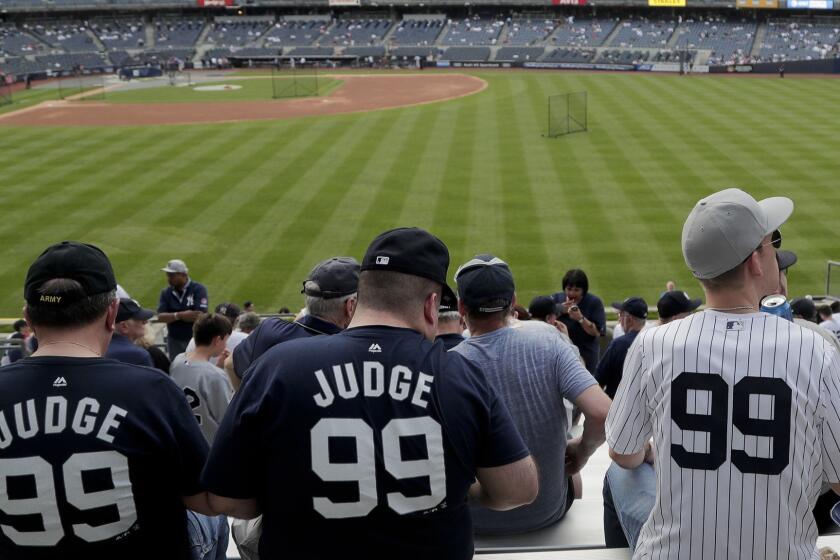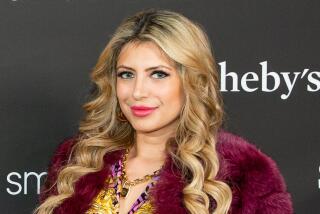MLB and players’ union mull testing for opioids while easing marijuana penalties

NEW YORK — When healthy, Kyle Blanks could crush a baseball. In the final 32 games of 2009, his rookie season with the San Diego Padres, playing in a home field so cavernous it was known as Petco National Park, Blanks hit 10 home runs.
But he never hit that many home runs in a season again, his career deteriorated by a procession of injuries and surgeries to his elbow, leg and shoulder, and procedures on both feet. In 2017, as he finished his professional career in the minor leagues, the pain was so persistent that Blanks said he got relief from alcohol: a half-bottle of rum some days, a whole bottle on others.
It made no sense to him that he could use marijuana to ease his discomfort as a major leaguer because there was no testing, but not in the minors, where there was. And on one of his most agonizing days, he said, the discomfort in his heel was so excruciating that he popped an opioid so he could finish a game.
When Angels pitcher Tyler Skaggs died in July, he had the opioids fentanyl and oxycodone as well as alcohol in his bloodstream, according to toxicology tests. Baseball does not test major league players for opioids, but after Skaggs’ death that policy is under review by the commissioner’s office and players’ union.
The league would “absolutely” like to add opioid testing for next season, said Dan Halem, the league’s deputy commissioner. Tony Clark, the executive director of the players’ association, said the union plans to work with the league to assess “all of our drug protocols relating to education, treatment and prevention.”
The parties have discussed whether to loosen baseball’s restrictions on marijuana — not specifically as a trade-off for opioid testing, but as part of the annual review of the sport’s drug policy, according to three people familiar with the talks but not authorized to comment publicly on them.
A recent study found that over 800 fans had been injured by baseballs at MLB games since 2012. That number is likely just the tip of the iceberg.
The discussions reflect in part the national trend toward legalization of marijuana, even as it remains on the federal register of controlled substances. According to the Marijuana Policy Project, 11 states have legalized marijuana for recreational purposes, 33 states have done so for medicinal purposes, and 26 states have decriminalized marijuana.
The talks could determine whether major and minor leaguers would be allowed to use marijuana at all times, to recover from particular injuries, or for general pain management.
Fentanyl killed more than 31,000 people in the United States last year. Amid the national opioid crisis, the league and the union would like to learn whether marijuana might offer a reasonable and responsible option in pain management.
Representatives from owners and players are expected to solicit input from the medical community on the effects and effectiveness of marijuana — and of CBD, a substance derived from the cannabis plant that contains a tiny amount of THC, the psychoactive compound that produces the high among marijuana users. CBD can be used in creams, gels and gummies, and proponents say it can reduce pain without side effects.
Jon Coyles, MLB vice president of drug, health and safety programs, advised major and minor league players in a March 14 memo that CBD, like marijuana, was a banned substance. Coyles warned that players could test positive for marijuana by using a CBD product.
“Claims of CBD products being ‘THC free’ are false and misleading,” Coyles wrote. “We have seen multiple positive drug tests … in the past year for THC that appear to have resulted from the use of CBD products, despite the product labels.”
Under current policy, opioids and marijuana are classified as “drugs of abuse” and banned from the sport. However, major league players are not routinely tested for drugs of abuse, only for performance-enhancing drugs.
In the minor leagues, where the union does not represent players, testing is conducted for opioids and marijuana, among other drugs. A first positive test remains confidential, with players referred to counseling and treatment programs. Any subsequent positive test triggers a suspension.
Thirteen minor league players were suspended for marijuana this season, the league said, with multiple positive tests necessary for a suspension. Overall, about 80% of the positive tests for drugs of abuse were for marijuana. Also, about 80% of the suspensions for drugs of abuse were for marijuana. One of the suspensions was for opioids.
In the majors, opioid and marijuana testing is conducted only with reasonable cause, or as part of a treatment program.
Halem said the league does not believe it has an opioid problem. Players can obtain short-term doses from surgeons following operations, but team doctors are forbidden from prescribing or dispensing opioids. The league depends on a team’s medical staff and other trained employees to report suspicious behavior that could provide reasonable cause for testing.
The average time of a nine-inning baseball game reached a record length in the majors this season.
“Controlled substances are difficult to regulate in a team environment, so we decided not to use them,” Halem said. “In terms of illicit use of opioids, we haven’t heard that much.”
Still, investigators have yet to say how they believe Skaggs acquired the opioids that killed him. The Drug Enforcement Agency is investigating. So is the police department in Southlake, Texas, the city where Skaggs died on an Angels road trip, and Rusty Hardin, the attorney retained by Skaggs’ family.
Halem said the league investigation is on hold.
“We are not going to do anything until law enforcement is done,” he said. “Whatever the facts are, the facts are. And then we’ll handle it appropriately.”
On Aug. 30, when autopsy results revealed that Skaggs choked to death with fentanyl, oxycodone and alcohol in his system, the Skaggs family issued a statement that said in part: “We were shocked to learn that [Skaggs’ death] may involve an employee of the Los Angeles Angels.”
The family has not publicly shared evidence to support that claim. Hardin said Wednesday the family remains concerned but investigators need to complete their work.
“We want to stay on the sidelines and not get in the way of any law enforcement investigation that might be going on,” he said, “and we are as anxious to find out what happened as anyone else.”
When pitcher Nick Adenhart died 10 years ago, killed by a drunk driver, the Angels mourned for the balance of the season, but they knew what had happened to their friend and teammate, and how and why.
The Angels are in the unsettling position of knowing what happened to Skaggs, but not how and why, and what investigators eventually determine could be announced in weeks or months, or even after the team has assembled anew next spring.
“Everyone, including our organization, wants answers,” Angels spokeswoman Marie Garvey said. “Our focus is on cooperating with the ongoing investigations that will help accomplish that.”
Blanks, now a partner in a company that sells CBD products, did not know Skaggs, but he could not help but wonder whether marijuana might have prevented him from taking opioids. Blanks did know that Skaggs had undergone surgery during his career, and because of that Blanks suspected that he had been exposed to opioids before the day he died.
“No different for me,” Blanks said. “I woke up every time.”
More to Read
Go beyond the scoreboard
Get the latest on L.A.'s teams in the daily Sports Report newsletter.
You may occasionally receive promotional content from the Los Angeles Times.













